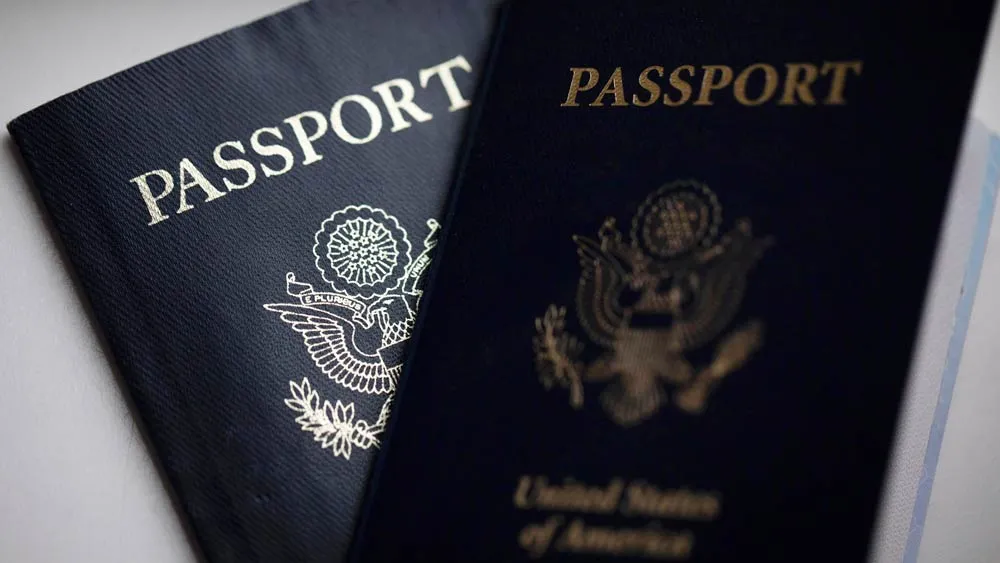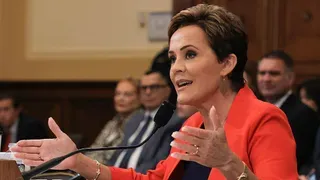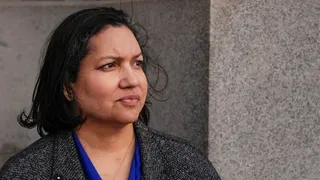May 11, 2012
Gay Rights Backers See History in Obama's Stand
Jason St. Amand READ TIME: 8 MIN.
NEW YORK (AP) - At a birthplace of the gay rights movement, patrons of New York City's Stonewall Inn said they felt like they were living history. In Wyoming, the mother of a man beaten to death because of his sexuality said words couldn't express her gratitude. An 82-year-old photographer who chronicled protests in the 1960s called it "a new dawn."
President Barack Obama's declaration Wednesday that he supports gay marriage may have lacked the urgency of Kennedy's 1963 push for the Civil Rights Act, or the force and finality of the Emancipation Proclamation, but it was still being greeted as a major milestone among people who care about gay rights.
"It signifies a history-changing moment when a president finally says, 'I'm on your side.' It's a critical moment," said Stacy Lentz, a co-owner of the Stonewall, a reincarnated version of the unlicensed gay bar in Manhattan's West Village that was the site of riots following a police raid in 1969.
Just how big of a moment remains to be seen. While public opinion polls show an increasing number of Americans are receptive of gay marriage, and accepting of homosexuality in general, the movement hasn't fared well at the ballot box. On Tuesday, North Carolina voters overwhelmingly approved a constitutional amendment defining marriage as between a man and a woman.
Still, at mileposts and bastions in the struggle, Obama's words were being welcomed.
___
VERMONT
Holly Puterbaugh, 65, and her partner, Lois Farnham, were among the three Vermont same-sex couples who sued the state in 1997 after they were denied a marriage license. Their lawsuit led to the 1999 court decision that made Vermont the first state to recognize same-sex civil unions.
Back then, Puterbaugh never would have believed a president would someday back same-sex marriage, she said in a phone interview Thursday.
"We've come a lot further a lot faster than I thought we would," she said. "In '99, civil union was considered the most outrageously liberal thing going. Now it's the conservative fallback.
"That tells me people are looking, they are thinking, they are starting to really examine this as a true issue," she said.
Another couple in that landmark lawsuit, Nina Beck and Stacy Jolles, had also viewed same-sex marriage as a romantic ideal, and maybe a legal longshot, when they took up the fight. Now, things have changed.
"When we went to the city hall in South Burlington to ask for a marriage license, it was very simply the first step on what we thought would be a very long road, but we had to take the first step," Beck said. "I don't think either of us ever imagined that we necessarily would be, you know, 15 or 16 years later in the position of hearing the president of the United States come out in support of same-sex marriage. But it's an amazing and wondrous thing that, here we are."
___
WYOMING
To social conservatives and some church leaders, the debate over gay marriage is partly about government intrusion on an institution that, at its core, is based in the deepest religious traditions.
To others, it's about eradicating hate.
In late 1998, Matthew Shepard, a slender, 21-year-old student at the University of Wyoming, was robbed, fatally beaten and tied to a fence by two men he met in a bar in Laramie. The killers, police said, targeted him because he was gay. His death prompted changes. Congress passed hate crimes legislation bearing his name in 2009.
Now, Shepard's mother, Judy, hopes Obama's words might get people thinking again, and not just about marriage.
"To me, that's what this issue is - a matter of civil rights," she said.
"He's following the change of the nation as a whole, I think," Shepard said of Obama. "But to have the actual president say he's in favor of it, when our previous president was so public about being against it, is just so big. I can't even ... there's no words."
The Wyoming Legislature, where Republicans outnumber Democrats 76-14, last year considered but ultimately rejected a proposal that would have barred recognition of same-sex marriages performed in other states.
State Rep. Cathy Connolly, D-Laramie, a lesbian, said she believes that feelings about gays and lesbians in the state are different than they were in 1998. Even in a state Legislature that could be defined as very conservative, she said anti-gay measures are seen as inappropriate.
"Times have changed," Connolly said.
___
NEW YORK
In 1969, the New York Daily News trumpeted the dawn of the gay rights movement with this headline: "Homo Nest Raided, Queen Bees Are Stinging Mad."
In the story that followed, about riots in a gay neighborhood following the police raid at Stonewall Inn, the paper taunted the club's patrons as "little girls" and "ladies-in-waiting." They didn't speak or walk, they "lisped" and "pranced," and were described as being more concerned about their hairdos being disturbed than social justice.
That kind of disparaging language hasn't disappeared from the American dialogue quite yet, and even as Obama's remarks were celebrated, gay and lesbian leaders like Christine Quinn, the speaker of New York's City Council, noted that they came shortly after the hurtful vote in North Carolina.
"It is an upsetting thing, to think about people going into the voting booth and casting a vote that, in essence, is against who I am and against what my family is. That's upsetting," she said. "Whether you're the speaker of the City Council or a 13-year-old girl, that hurts. Who likes to think about people not liking them? ... It's something that eats at you, whether you want to admit it or not."
Quinn said the president's words were an emotional salve after that ballot-box loss - a sentiment that was shared by patrons at the Stonewall, where a sign outside the door Wednesday night said, "Obama supports gay marriage. Let's drink."
"We've never had a president that stood up for us," said patron Nancy Pizarro, as she sat with friends at the bar. "I feel like I'm living history."
New York last year became the largest state to recognize same-sex marriage, with a surprise vote in the legislature, quickly signed into law by Gov. Andrew Cuomo.
___
WASHINGTON
Lilli Vincenz, 74, was one of about a dozen people who were part of the first gay rights protest in front of the White House in 1965, back in an era when almost no one in power took the issue seriously.
"It was so important that we become visible, because we weren't really visible before," said Vincenz, who now lives in Arlington, Va., and for decades has driven a car with a license plate that reads "Change."
Vincenz said she was proud to march that day, and she is thrilled that Obama has embraced gay marriage.
"It's very important, and it's very important for the rest of the United States," said Vincenz, who was discharged from the Army in 1963 for being gay.
Vincenz and her partner, Nancy Ruth Davis, held a commitment ceremony in Key West, Fla., in 1986, but they are not legally married. Obama's announcement got her thinking about marrying legally, she said, though she doesn't particularly want to travel to one of the six states and the District of Columbia that allow same-sex marriage.
Kay Tobin Lahusen, 82, a photojournalist who chronicled the early gay rights movement in the 1960s and marched in many early protests, called the president's announcement "a new dawn for our movement."
She said that during one of the early protests at the White House, demonstrators handed a letter to someone at the White House gates, hoping it would get to President Lyndon Johnson. They never learned if it did.
In those early days, she said, gay marriage seemed "out of the question" and "the impossible dream."
"Much of the movement thought it was just impossible and fanciful and perhaps just a little bit trivial," she said. "I felt it was absolutely key to our movement. I always believed it was something we should fight for."
Lahusen, who now lives in Kennett Square, Pa., never married her partner of 46 years, Barbara Gittings, who died in 2007. But she said the two were "married in our hearts."
___
MASSACHUSETTS
Politically, Obama might be taking a big risk by weighing in on gay marriage, just as the presidential contest is taking shape.
David Wilson, 68, one of the first gay men to legally marry in Massachusetts, said he would have been content if the president waited until after the election to declare his support, but was ecstatic he didn't.
"It was a complete validation of all the work that we've done," he said.
Wilson and his husband, Rob Compton, 62, were married on May 17, 2004, the first day they could legally wed. They now live in Provincetown, Mass.
Wilson said he thought most of all about what the announcement says to his five adult children and seven grandchildren, who talk about marriage equality in school.
"They always look for other role models to help tell the story, and what better role model than to have the president of the United States stand up for their two papas," he said.
"President Obama has legitimized our marriage and also the word that comes to mind is normalcy. It feels like it's one step closer to normalcy," Wilson said. "So this is just one more way for the country to see our relationships, our marriage, as not just legal, but legitimate and normal."
___
SAN FRANCISCO
There were limits to Obama's support for gay marriage. Notably, he said he believed that it was up to individual states to decide whether they would legalize same-sex marriages. That contrasted sharply with President John F. Kennedy's forceful condemnation of segregation in a nationally televised address in 1963, during which he called for federal legislation to end racial discrimination, and said states couldn't be left to deal with matters on their own.
At low-key celebrations in San Francisco's historically gay Castro District on Wednesday night, Cleve Jones, a prot�g� of slain gay rights pioneer Harvey Milk, said he spent time trying to explain "how long it's taken us to get to this point" to young people who reacted cynically to the president's announcement.
He said the closest historical precedent to Obama's statement was the opposition from then-President Jimmy Carter and his soon-to-be successor, Ronald Reagan, to a 1978 California ballot initiative that would have prevented gays and lesbians from teaching in the state's public schools.
"It is historic. It would be difficult to overstate the significance of it to the movement," Jones said.
Stuart Gaffney, a plaintiff in a lawsuit challenging the legality of a California constitutional amendment outlawing same-sex unions, also said there was much to celebrate in the president's remarks.
"I have never felt so proud to be an American," he said. "I think the president looked at this with his heart, not as a political calculation, but what's the right thing to do? That's what any president should do. He stood on the side of love."
___
MICHIGAN
In the early 1970s, a waiter left his shift at a restaurant in the college town of East Lansing, Mich., and was greeted affectionately by his boyfriend. His manager saw. The waiter was fired on the spot. It was legal.
George Griffiths, who turned 83 on Thursday, was a member of both the local American Civil Liberties Union board and the East Lansing City Council at the time.
He knew the ACLU couldn't regulate a private employer - but thought maybe the city could protect its employees or job candidates from discrimination.
In 1972, he became among the majority of council members to adopt an anti-discrimination measure in hiring practices for the city - the first such ordinance in the nation.
He experienced little backlash within the communities of East Lansing and Michigan State University, he said, though he recalled occasional criticism by voters during subsequent - but successful - campaigns for higher office. He served as Ingham County's drain commissioner for 12 years, retiring in 1993.
Griffiths sees Obama's announcement as a natural progression from the steps he and his colleagues took 40 years ago.
"It's a glacial movement," he said, "but I think people are coming around."




